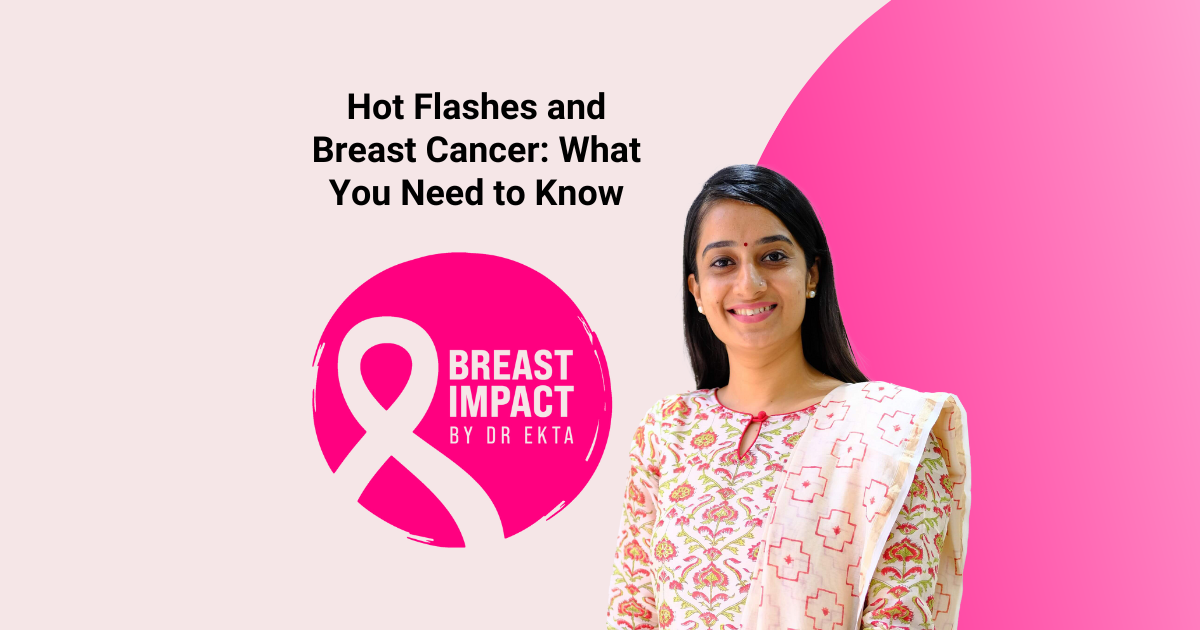Hot flashes are a common symptom for many women, especially during menopause. But for those diagnosed with breast cancer or undergoing treatment, hot flashes can be more frequent, intense, and disruptive. This blog explores the connection between hot flashes and breast cancer, what causes them, and how patients can manage this uncomfortable side effect. My goal is to empower individuals with clear, fact-based guidance to better understand their symptoms and seek the right support.
Why Do Hot Flashes Occur in Breast Cancer Patients?
Hot flashes happen when there is a sudden feeling of warmth, typically over the face, neck, and chest. For breast cancer patients, several factors can trigger or worsen hot flashes:
- Hormonal therapy: Treatments like tamoxifen or aromatase inhibitors reduce estrogen levels, which commonly triggers hot flashes.
- Chemotherapy: Certain chemo drugs can push premenopausal women into early menopause.
- Surgical menopause: Removal of ovaries due to cancer risk leads to a sudden drop in hormones.
- Stress and anxiety: Emotional stress related to cancer diagnosis and treatment can increase the frequency of hot flashes.
Symptoms of Hot Flashes
Understanding the symptoms can help patients track and report them effectively to their care team.
- Sudden wave of warmth in the upper body
- Red or flushed skin, particularly on the face and neck
- Rapid heartbeat or palpitations
- Excessive sweating, especially at night (night sweats)
- Chills following the heat wave
These symptoms can vary in intensity and frequency, affecting daily activities and quality of sleep.
Managing Hot Flashes During Breast Cancer Treatment
Though hot flashes can be uncomfortable, several strategies can help manage them without interfering with cancer treatment.
Lifestyle Changes
- Dress in layers that can be easily removed
- Use fans or air conditioning to stay cool
- Avoid spicy foods, alcohol, and caffeine
- Quit smoking, as it worsens hot flashes
- Practice stress-reducing activities like yoga, meditation, or deep breathing
Diet and Hydration
- Stay well-hydrated with water and herbal teas
- Include soy-based foods (with doctor’s approval) as they may help some patients
- Eat smaller, more frequent meals to stabilize body temperature
Staying hydrated and following evidence-based diet tips for breast cancer patients can also reduce the intensity of hot flashes.
Physical Activity
- Engage in regular, moderate exercise such as walking or swimming
- Exercise in cool environments to prevent overheating
- Physical activity helps improve mood and reduces the intensity of hot flashes
Explore our summer safety tips for cancer patients
Medical Treatments for Hot Flashes in Breast Cancer
Some patients may need additional medical support if lifestyle changes aren’t enough.
Non-Hormonal Medications
Doctors may prescribe medications that are not hormone-based but help reduce hot flashes:
- SSRIs and SNRIs: Antidepressants like venlafaxine and paroxetine
- Gabapentin: A nerve pain medication that can reduce hot flashes
- Clonidine: Originally a blood pressure medication, also used for hot flashes
Note: Always consult your oncologist before starting any new medication.
Complementary Therapies
- Acupuncture: Some patients find relief from regular acupuncture sessions
- Cognitive Behavioral Therapy (CBT): Useful for managing the psychological impact of hot flashes
Natural remedies for hot flashes during cancer treatment include- - Herbal remedies (e.g., black cohosh, red clover)
- Dietary changes (e.g., incorporating phytoestrogen-rich foods)
- Mind-body practices (e.g., relaxation techniques, deep breathing)
Emotional and Mental Health Support
Hot flashes can disrupt sleep and increase anxiety, affecting emotional well-being.
Coping Strategies
- Join support groups for breast cancer survivors
- Speak with a counselor or psychologist
- Keep a symptom diary to understand triggers
- Use relaxation techniques before bedtime
Read our guide on cancer and emotional health
When to Talk to Your Doctor
Patients should speak with their healthcare provider if:
- Hot flashes are severe or worsening
- They interfere with sleep, mood, or daily functioning
- There’s uncertainty about which remedies are safe with cancer treatment
Your oncology team can help tailor a symptom management plan to suit your needs.
Trusted References
- American Cancer Society – Managing Hot Flashes
- National Cancer Institute – Side Effects of Cancer Treatment
- CDC – Breast Cancer Treatment Guidelines
Final Thoughts
Hot flashes are a common but manageable side effect for many undergoing breast cancer treatment. By understanding the connection between hot flashes and breast cancer, patients can take practical steps to improve their comfort and well-being. Whether through lifestyle adjustments, medical treatments, or emotional support, there are many paths to relief. Stay informed, stay cool, and stay in touch with your care team.

